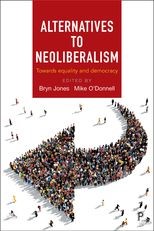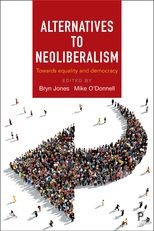Alternatives to Neoliberalism: Towards Equality and Democracy
Alternatives to Neoliberalism: Towards Equality and Democracy
Cite
Abstract
In this collection, innovative and eminent social and policy analysts, including Colin Crouch, Anna Coote, Jeremy Gilbert, Grahame Thompson and Ted Benton, challenge the failing but still dominant ideology and policies of neo-liberalism. The book suggests extending and deepening democracy and participation into economic and cultural institutions for greater material and social equality to reinforce established social democratic principles of redistribution and public investment. Updated to assess the Brexit and Trump upsurges, the editors’ synthesis offers a framework for a revitalised social democracy. It links concepts such as Polanyi’s ‘commons’ and Habermas’s ’lifeworld’ to the attempts by social justice, feminist, environmentalist movements to advance equality through democratisation and market accountability to civil society. The lifeworld of voluntary associations, families and communities is proposed as the logical starting point for radical transformation, not in ‘blue-sky’ projects, but in existing alternatives like: community organisations, municipal enterprises, mutual and cooperative societies, social movement organisations, and trade-union branches. As well as the more informal networks in which popular involvement is already shaping solutions to the human needs which neoliberalism frustrates. The collection critically dissects, but goes beyond the ideologies and institutions of neoliberalism. It identifies the agents which could promote an alternative political economy for the UK; one based on local and international models of democratic governance to rival and displace prevailing market and corporate dominance. Its combination of critique, analysis and political engagement could be invaluable for those teaching, studying and campaigning for transformative political, economic and social policies.
-
Front Matter
-
Introduction
The open-market society and its opponents: an overview
-
Part One Alternative paradigms and perspectives: Editors’ overview
-
One
Modes of anti-neoliberalism: moralism, Marxism and 21st century socialism
Jeremy Gilbert
-
Two
People, planet, power: toward a new social settlement
Anna Coote
-
Three
Beyond neoliberalism, or life after capitalism? A red-green debate
Ted Benton
-
Four
The democratic deficit: institutional democracy
Mike O’Donnell
-
One
Modes of anti-neoliberalism: moralism, Marxism and 21st century socialism
-
Part Two Reform within economic and governance restraints: pushing the boundaries: Editors’ overview
-
Five
The limits of neoliberalism? Austerity versus social policy in comparative perspective
Kevin Farnsworth andZoë Irving
-
Six
The European Union and the UK: neoliberalism, nationalist populism, or a cry for democracy?
Bryn Jones andMike O’Donnell
-
Seven
Reform from within? Central banks and the reconfiguration of neoliberal monetary policy
Grahame F. Thompson
-
Eight
The corporate cuckoo in the neoliberal nest: reconnecting civil society with big business
Bryn Jones
-
Nine
Avoiding ‘back to the future’ policies by reforming the ‘foundational economy’
Sukhdev Johal and others
-
Five
The limits of neoliberalism? Austerity versus social policy in comparative perspective
-
Part Three Economic and political democracy: restoring the market-civil society balance: Editors’ overview
-
End Matter
Sign in
Personal account
- Sign in with email/username & password
- Get email alerts
- Save searches
- Purchase content
- Activate your purchase/trial code
Institutional access
-
Sign in through your institution
- Sign in with a library card Sign in with username/password Recommend to your librarian
Institutional account management
Sign in as administratorPurchase
Our books are available by subscription or purchase to libraries and institutions.
Purchasing information| Month: | Total Views: |
|---|---|
| October 2022 | 3 |
| October 2022 | 1 |
| October 2022 | 2 |
| October 2022 | 1 |
| November 2022 | 1 |
| November 2022 | 1 |
| November 2022 | 1 |
| November 2022 | 1 |
| November 2022 | 1 |
| November 2022 | 1 |
| November 2022 | 2 |
| November 2022 | 1 |
| November 2022 | 2 |
| November 2022 | 1 |
| November 2022 | 2 |
| November 2022 | 2 |
| November 2022 | 1 |
| November 2022 | 3 |
| November 2022 | 3 |
| November 2022 | 1 |
| November 2022 | 1 |
| November 2022 | 1 |
| November 2022 | 1 |
| November 2022 | 1 |
| November 2022 | 1 |
| November 2022 | 1 |
| November 2022 | 1 |
| November 2022 | 1 |
| November 2022 | 2 |
| November 2022 | 1 |
| December 2022 | 1 |
| December 2022 | 1 |
| December 2022 | 3 |
| December 2022 | 3 |
| December 2022 | 1 |
| December 2022 | 13 |
| December 2022 | 4 |
| December 2022 | 3 |
| February 2023 | 1 |
| March 2023 | 1 |
| March 2023 | 1 |
| April 2023 | 1 |
| April 2023 | 2 |
| April 2023 | 1 |
| April 2023 | 1 |
| April 2023 | 5 |
| April 2023 | 3 |
| April 2023 | 4 |
| April 2023 | 1 |
| May 2023 | 4 |
| May 2023 | 1 |
| May 2023 | 2 |
| May 2023 | 3 |
| June 2023 | 1 |
| October 2023 | 2 |
| October 2023 | 1 |
| October 2023 | 4 |
| October 2023 | 1 |
| October 2023 | 1 |
| October 2023 | 1 |
| October 2023 | 1 |
| November 2023 | 1 |
| November 2023 | 1 |
| November 2023 | 2 |
| November 2023 | 1 |
| November 2023 | 2 |
| December 2023 | 1 |
| December 2023 | 1 |
| December 2023 | 4 |
| January 2024 | 3 |
| February 2024 | 3 |
| February 2024 | 1 |
| February 2024 | 1 |
| February 2024 | 1 |
| March 2024 | 1 |
| March 2024 | 1 |
| March 2024 | 2 |
| April 2024 | 1 |




Get help with access
Institutional access
Access to content on Oxford Academic is often provided through institutional subscriptions and purchases. If you are a member of an institution with an active account, you may be able to access content in one of the following ways:
IP based access
Typically, access is provided across an institutional network to a range of IP addresses. This authentication occurs automatically, and it is not possible to sign out of an IP authenticated account.
Sign in through your institution
Choose this option to get remote access when outside your institution. Shibboleth/Open Athens technology is used to provide single sign-on between your institution’s website and Oxford Academic.
If your institution is not listed or you cannot sign in to your institution’s website, please contact your librarian or administrator.
Sign in with a library card
Enter your library card number to sign in. If you cannot sign in, please contact your librarian.
Society Members
Society member access to a journal is achieved in one of the following ways:
Sign in through society site
Many societies offer single sign-on between the society website and Oxford Academic. If you see ‘Sign in through society site’ in the sign in pane within a journal:
If you do not have a society account or have forgotten your username or password, please contact your society.
Sign in using a personal account
Some societies use Oxford Academic personal accounts to provide access to their members. See below.
Personal account
A personal account can be used to get email alerts, save searches, purchase content, and activate subscriptions.
Some societies use Oxford Academic personal accounts to provide access to their members.
Viewing your signed in accounts
Click the account icon in the top right to:
Signed in but can't access content
Oxford Academic is home to a wide variety of products. The institutional subscription may not cover the content that you are trying to access. If you believe you should have access to that content, please contact your librarian.
Institutional account management
For librarians and administrators, your personal account also provides access to institutional account management. Here you will find options to view and activate subscriptions, manage institutional settings and access options, access usage statistics, and more.